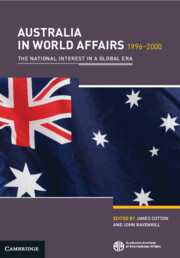Book contents
- Frontmatter
- Contents
- Figure
- Contributors
- Preface
- Abbreviations
- Part I Setting the Scene
- Part II Relationships
- Part III Issues
- 11 Facing an Uncertain Future: Defence and Security under the Howard Government
- 12 The East Timor Commitment and Its Consequences
- 13 Australia in World Environmental Affairs
- 14 Australia and the International Human Rights Regime1
- 15 Australia and the Global Economy
- 16 Australia and the Asian Economic Crisis
- References
- Index
13 - Australia in World Environmental Affairs
from Part III - Issues
Published online by Cambridge University Press: 04 May 2024
- Frontmatter
- Contents
- Figure
- Contributors
- Preface
- Abbreviations
- Part I Setting the Scene
- Part II Relationships
- Part III Issues
- 11 Facing an Uncertain Future: Defence and Security under the Howard Government
- 12 The East Timor Commitment and Its Consequences
- 13 Australia in World Environmental Affairs
- 14 Australia and the International Human Rights Regime1
- 15 Australia and the Global Economy
- 16 Australia and the Asian Economic Crisis
- References
- Index
Summary
The nature of Australia’s economy and ecosystem ensures that Australian governments have taken a continued interest in the negotiations for, and implications of, most of the world’s multilateral environmental agreements. Australia has an energy-intensive economy. Agriculture and extractive industries, both of which have had severe environmental consequences, contribute significantly to export earnings. The country is both highly urbanised (around 85 per cent of the population lives in cities) and the world’s only industrialised ’mega-diverse’ country, custodian of about 10 per cent of the world’s biodiversity. Australia is also one of the few industrialised countries that suffers extensive desertification – over half of the country’s land area is in need of some form of repair. Australia’s exclusive economic zone – 11 million square kilometres of marine waters – is one of the largest in the world. Australia’s environmental role in world affairs includes its domestic responses to environmental treaty obligations and its commitment to sustainable development both at home and abroad.
Keywords
- Type
- Chapter
- Information
- Australia in World Affairs 1996–2000The National Interest in a Global Era, pp. 164 - 177Publisher: Cambridge University PressFirst published in: 2024



